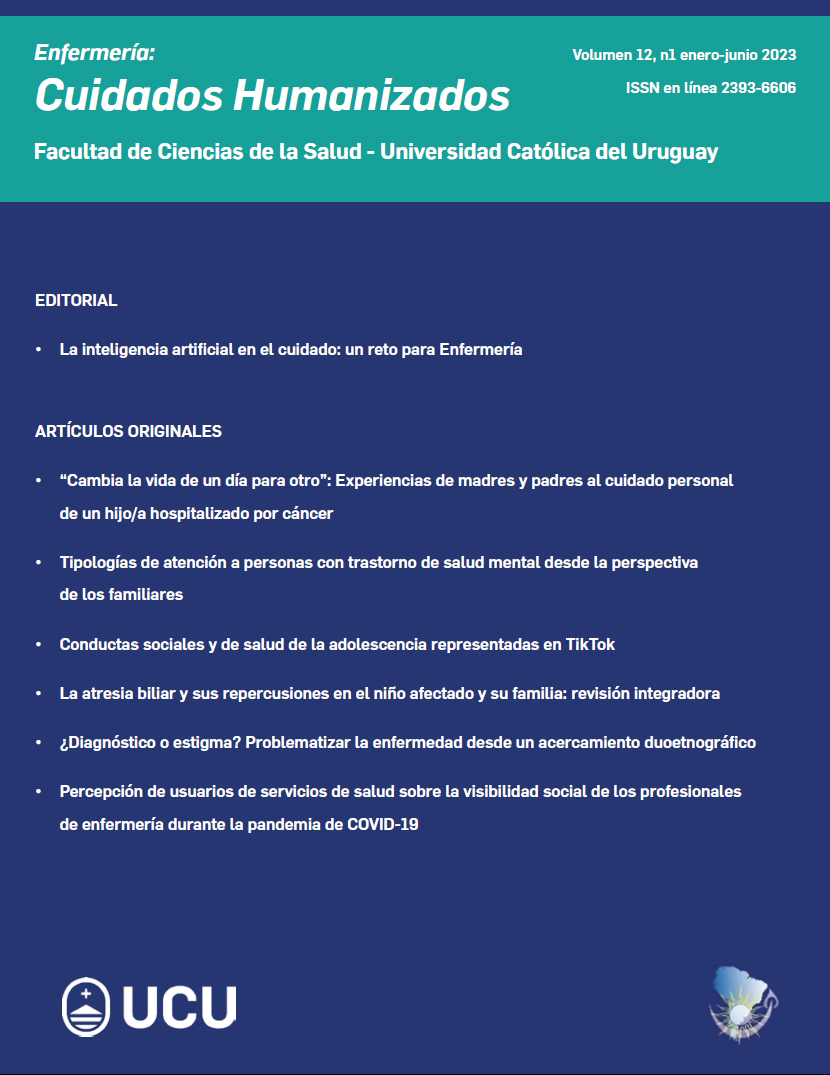Types of care for people with mental health disorder from the perspective of family members
DOI:
https://doi.org/10.22235/ech.v12i1.3018Keywords:
standard of care, family, caregivers, mental health assistanceAbstract
Objective: To identify the types of daily care for people with mental health disorder from the perspective of family members. Method: This is an exploratory and descriptive study with a qualitative approach. Data collection was carried out using semi-structured interviews with fifteen family members of people with mental health disorder followed up in a specialized mental health service in a city in the Northeast of Brazil. The data was organized and analyzed according to the thematic content analysis technique and discussed based on the literature. Results: The profile of the family members interviewed was characterized by a majority of female gender, black race, residing in the same household as the person with mental health disorder, with the mother being the main caregiver and with support from the other family members in the care. The main types of care were identified as: 1) vigilant care; 2) parental care; 3) overprotective care; 4) permissive care. Conclusion: The family cares for the person with mental health disorders according to their possibilities, however, some factors such as lack of knowledge, stigmas and prejudices can negatively interfere in the psychosocial rehabilitation and autonomy of the person. It is important that the health team provides guidance and support for family members, in order to promote integral care.
Downloads
References
Yasui S, Luzio CA, Amarante P. Atenção psicossocial e atenção básica: a vida como ela é no território. Revista Polis e Psique. 2018 [citado 2022 Out 13];8(1):173-190. doi: 10.22456/2238-152X.80426.
Salazar-Torres LJ, Castro-Alzate ES, Dávila-Vásquez PX. Caregiver burden in families of people with mental illness linked to the day hospital programme of a tertiary institution in the city of Cali (Colombia). Revista Colombiana de Psiquiatría. 2019 [citado 2022 Abr 6];48(2):88-95. doi: 10.1016/j.rcp.2017.08.002.
Hespanha P, Portugal S, Nogueira C, Pereira JM, Hespanha MJ. Doença mental, instituições e famílias: os desafios da desinstitucionalização em Portugal. Coimbra: Edições Almedina-CES: políticas, sociais; 2012.
Rosa LCS, Silva SLC. Família(s) e (Des)Institucionalização na Saúde Mental: Contexto e Perspectivas. Rev. FSA. 2020 [citado 2022 Nov 10];17(11):348-371. doi: 10.12819/2020.17.11.18.
Almeida MHS, Mendonça ES. Um olhar à família: ressonâncias psicossociais em familiares que convivem com uma pessoa em situação de transtorno mental. Revista Barbarói. 2017 [citado 2022 Jun 4];(49):01-24. doi: 10.17058/barbaroi.v0i49.6617.
Sampaio ML, Bispo JP. Rede de Atenção Psicossocial: avaliação da estrutura e do processo de articulação do cuidado em saúde mental. Cad. Saúde Pública. 2021 [citado 2023 Mar 11];37(3):e00042620. doi: 10.1590/0102-311X00042620.
Nascimento LA, Leão A. Estigma social e estigma internalizado: a voz das pessoas com transtorno mental e os enfrentamentos necessários. Hist Cienc Saude, Manguinhos. 2019 [citado 2022 Abr 30];26(1):103-121. doi: 10.1590/S0104-59702019000100007.
Bajil P, Coligcki D, Prevolnik-Rupel V, Brouwer WBF, Zrubka Z, Gulácsi L, et al. The burden of informal caregiving in Hungary, Poland and Slovenia: results from national representative surveys. Eur J Health Econ. 2019 [citado 2022 Mai 2];20(1):05-16. doi: 10.1007/s10198-019-01058-x.
Kantorski LP, Cardano M, Borges LR, Machado RA. The daily practices as key in mental health intervention. Esc Anna Nery. 2021 [citado 2023 Mar 11];25(1):e20190373. doi: 10.1590/2177-9465-EAN-2019-0373.
Brito PMC, Alves MB, Oliveira VM, Nóbrega MPSS, Baptista SCO, Silva RS. Users of alcohol and other drugs in the psychosocial care network: nursing care. Enfermería (Montevideo). 2021 [citado 2023 Mar 11];10(2):175-190. doi: 10.22235/ech.v10i2.2546.
Minayo MCS, Costa AP. Fundamentos Teóricos das Técnicas de Investigação Qualitativa. Revista Lusófona de Educação. 2018 [citado 2022 Nov 20];40:11-20. doi: 10.24140/issn.1645-7250.rle40.01.
Souza VR, Marziale MH, Silva GT, Nascimento PL. Translation and validation into Brazilian Portuguese and assessment of the COREQ checklist. Acta Paul Enferm. 2021 [citado 2022 Fev 2];34:eAPE02631. doi: 10.37689/acta-ape/2021AO02631.
Bardin, L. Análise de Conteúdo. São Paulo: Edições 70; 2016.
Magalhães JJ, Lopes RE, Nóbrega-Therrien SM, Vasconcelos SB. Caregiver Women’s Coping Strategies Toward Schizophrenia Bearing People. J. res. fundam. care. 2018 [citado 2022 Nov 20];10(3):793-800. doi: 10.9789/2175-5361.2018.v10i3.793-800.
Instituto Brasileiro de Geografia e Estatística. Desigualdades Sociais por Cor ou Raça no Brasil. Estudos e Pesquisas: Informação Demográfica e Socioeconômica. 2019 [citado 2022 Fev 28];41:1-12. Disponível em: https://biblioteca.ibge.gov.br/visualizacao/livros/liv101681_informativo.pdf.
Kantorski LP, Jardim VMR, Treichel CAS, Andrade APM, Silva MSSJ, Coimbra VCC. Gênero como marcador das relações de cuidado informal em saúde mental. Cad. saúde colet. 2019 [citado 2022 Ago 1];27(1):60-66. doi: 10.1590/1414-462X201900010071.
Ramos AC, Calais SL, Zotesso MC. Convivência do familiar cuidador junto à pessoa com transtorno mental. Contextos clínicos. 2019 [citado 2022 Ago 10];12(1):282-302. doi: 10.4013/ctc.2019.121.12.
Batista EC. Experiências vividas pelo cônjuge cuidador da esposa em tratamento psiquiátrico. Fractal, Rev Psicol. 2020 [citado 2023 Mar 11];32(1):31-9. doi: 10.22409/1984-0292/v32i1/5646.
Reis TL, Dahl CM, Barbosa SM, Teixeira MR, Delgado PGG. Burden and participation of family in the care of Psychosocial Care Centers users. Saúde em Debate. 2016 [citado 2022 Nov 20];40(109):70-85. doi: 10.1590/0103-1104201610906.
Downloads
Published
How to Cite
Issue
Section
License
Copyright (c) 2023 Enfermería: Cuidados Humanizados

This work is licensed under a Creative Commons Attribution 4.0 International License.

















